Though it may sound strange, I wanted to record some of my realizations regarding how to deal with the massive incoming information and how to gain & use information effectively.
When I talk about Information Era, I am NOT referring to the time when information technology explodes, but after that, when we are overwhelmed by massive information generated by various medias or even AI. According to relevant study, modern citizens percieve one million times more information than citizens back in 1000 A.D. The development of all medium and the widespread of personal computer contributes to the astonishing increase of information available. Therefore, I would like to focus on this aspect and demonstrate my understanding and methodology.
Understanding of Information era
What is information?
Information is from which data and knowledge can be derived, as data represents values attributed to parameters, and knowledge represents understanding of real things or abstract concepts.
In personal management perspective, a lot of topics is in essence information management.
- For task / project management, task is a piece of information with its description, due dates and other meta data; project is a group of files/materials and tasks.
- For knowledge management, it is concered with keeping your ideas, formal essays and literatures.
Characteristic of information
Information is infinite, quickly-updated
Compare to the limited time and effort each individual possess, the massive information generated each day and accumulated in the past seems infinite.
Different information may be contradicting
Due to different perspective and former knowledge, ones could have different views on the same thing. For example, in stock market, it is common that a lot of reviewers have contradicting views on whether the market is bearish or bullish.
The capture & storage of information takes time and effort
According to its definition, understanding and extracting the useful piece of information need human’s time and effort. Besides, the form of information varies, such as videos, articles, audios, etc. Handling different forms of information also requires individual’s time and effort.
Challenge in this era
With the characteristic of information above, this new era proposes new challenges. In the past ,people suffer from scarcity of information, the challenge is how to obtain information. To cope with this situation, reading books become a widly applied approach for perceiving information. On the contray, nowadays we suffer from redundant information source, while some may even be contradicting. The challenge now becomes how to quickly find the information needed, how to perform critical thinking against different viewpoints and make a sound decision in limited time and how to organize digital information.
Methodology in this era
Regarding to the characteristic of information and the new challenge proposed, I have formed the below methodology.
Be selective and make decision with sufficient information
As the information is infinite, we need to be astute when capturing information. This involves finding relevant information quickly (using search engine) and selecting those important ones that is most suitable for current situation.
Another key advice for this is to capture the first-hand information. This means one should try to be closer to information source or trusted publisher. When reading news, check multiple authorities's statement; when learning a new programming package, check the official documentation first. Being close to these information source is beneficial, for second-hand or third-hand information may lose details or involve noise.
The thought of coming with a ‘perfect’ plan should be abandoned. Since the available information is infinite, you could always use other source to further improve your plan. The best way to do this would be quickly draft a plan, start implementing it and continue with iterative perfections based on the feedback from your practice.
Develop critical thinking and make independent judgments
Due to the possible conflicting views from different information source, you need to develop the ability of critical thinking. You should evaluate views from different sides, find their statement, reasonings and evidence, and then based on your experience and knowledge to make a informed decision.
Form your own workflow for the capture, organization and induction of information
This is related the topic called PIM (Personal Information Management), which has a range of sub-topics like task management and knowledge management. Based on your purpose, you could find more detailed information in relevant fields.
Capture info: Search Engine Techniques
People seldom exploit the maximum usage of search engine. You could customize your search via simple formatting of your query, which significantly increase the relevance of the information you find.
Search for key phrases
“”Wrap up your phrase with
“”to search the entire phrase rather than search word by word.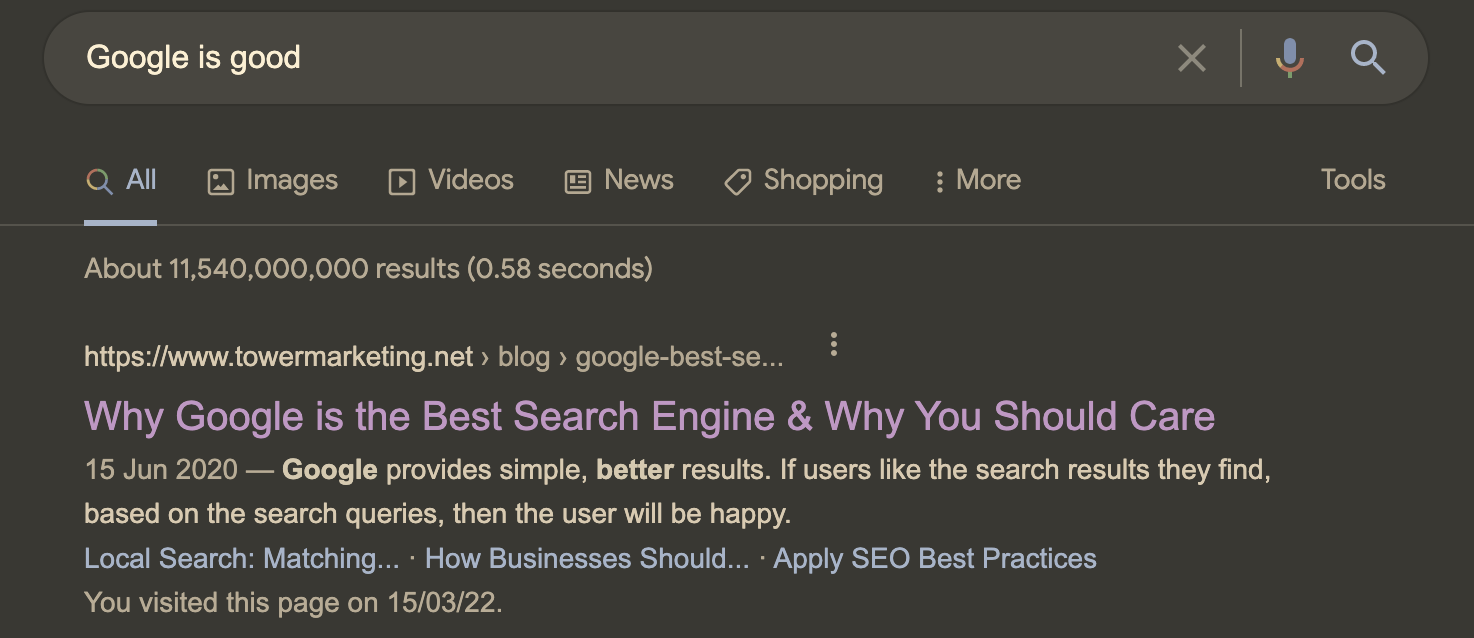
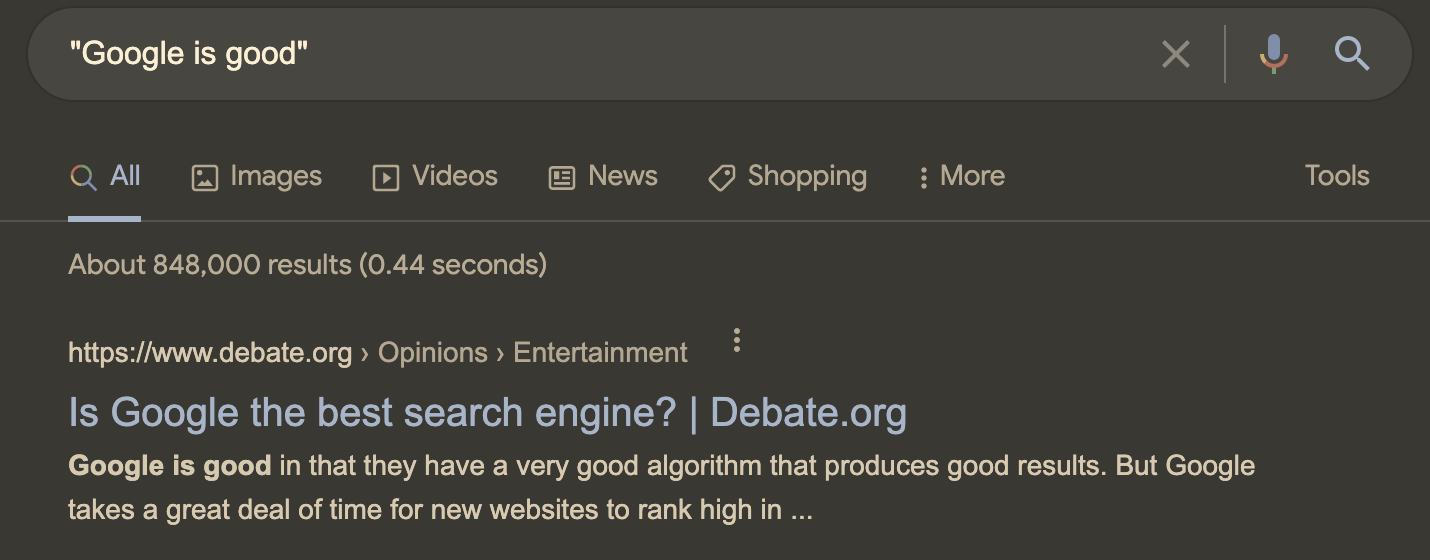
Exclude key phrases
-Use a
-before the keyword you would like to exclude.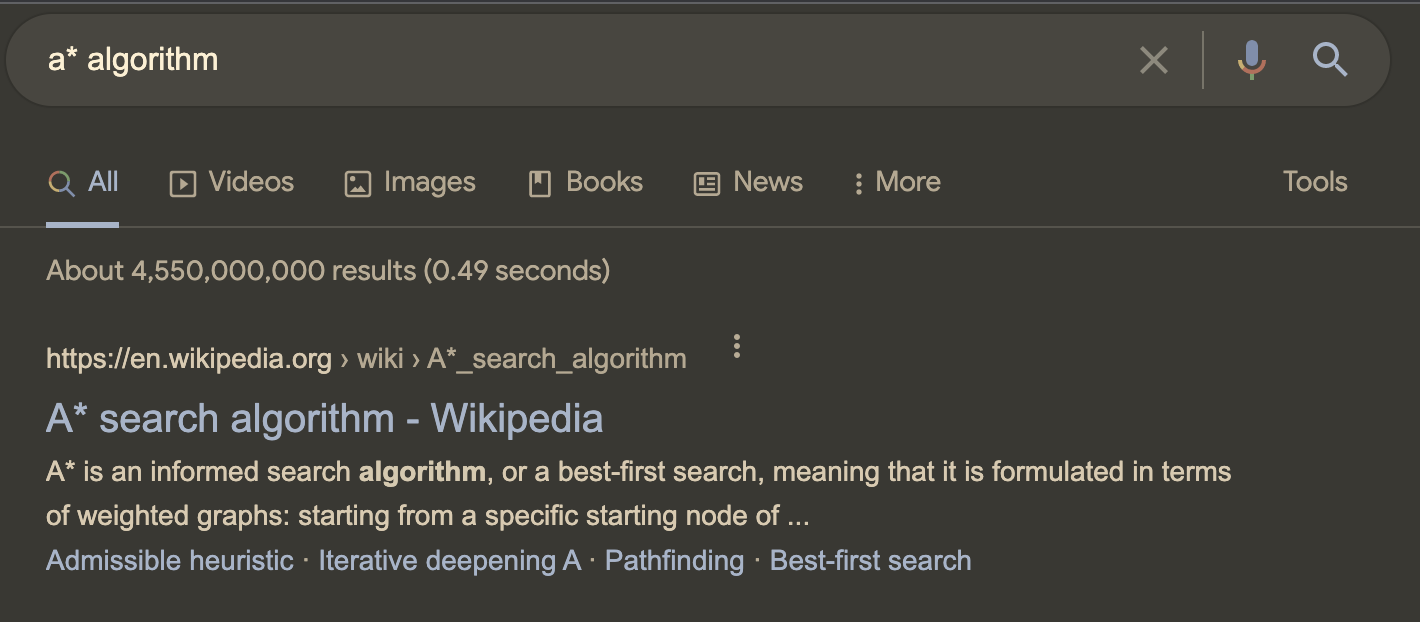
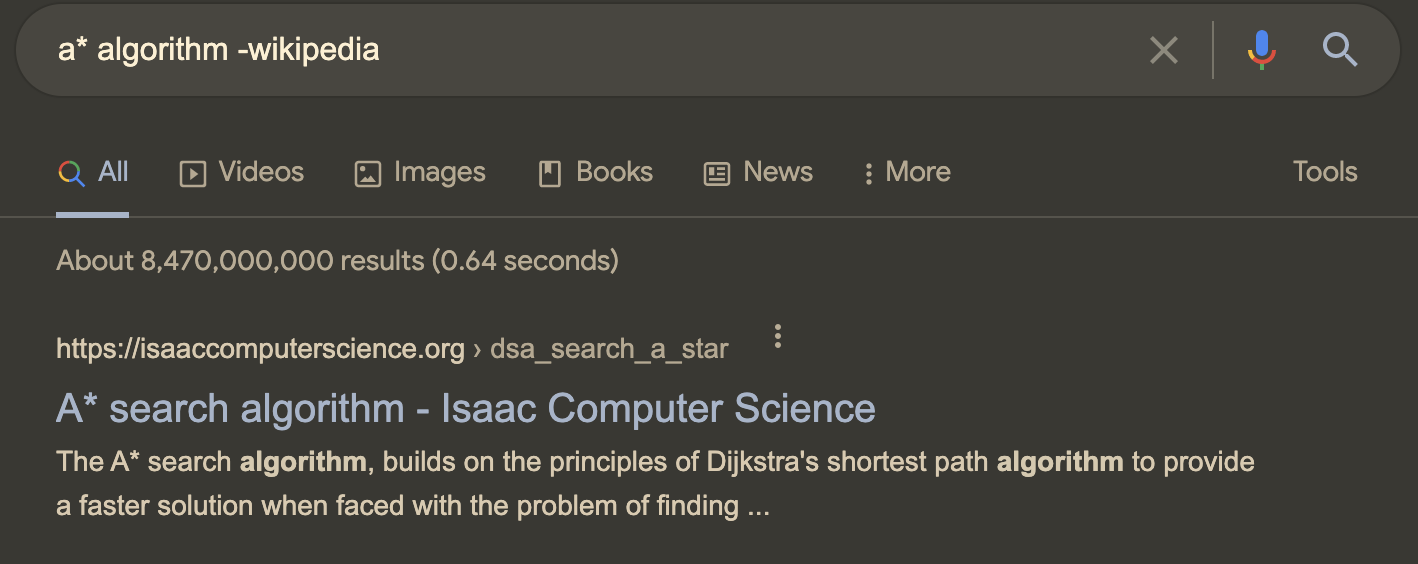
Searching for synonyms
~Place the
~in front of the search term.Using AND OR logic
Place keyword
ANDORbetween search terms to indicate whether you want all of them or part of them to appear in the search result.Using grammar to filter result
Suppose you want to find something in a particular website, use the keyword
site:. E.g.Awesome Computer Science Courses site:github.comSuppose you want to find something in specific file type, use the keyword
filetype:. E.g.How to take smart notes filetype:pdfSuppose you want to find related websites (have similar content), use the keyword
related:. E.g.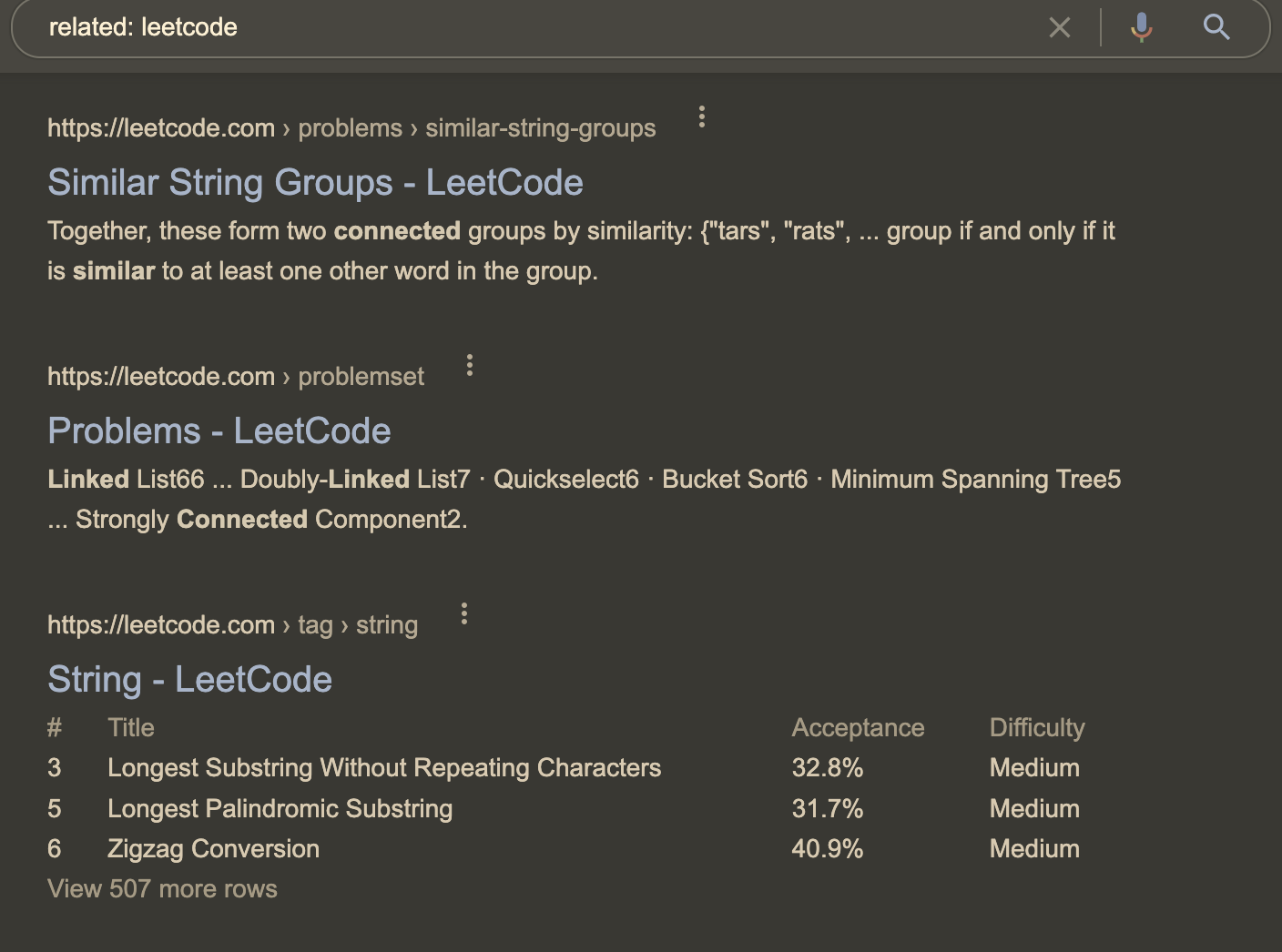
Suppose you want your search term to appear in the title of the search result, use the keyword
intitle:.
Organizing info: Categorization and Using tools
Categorization
Inspiration of this idea comes from David Allen’s book introducing GTD method. One of the principle in GTD is to collect all the things (to-dos, reference materials, action reminder, etc.) in one place and categorize them later to maintain organized. It is the same for organizing the information you captured.
To make use of them later, you should categorize them into different categories based on its type (video or article) or its topic. There are multiple ways of doing that, putting them in different folders or tagging them with different tags. The principle for the organization process is simple: the sorting process should be quick to execute, without much confusion and not tedious.
Below is an example of how I organize a specific type of information - research materials.
Literature management tools
As for me, I like to keep a record of the original copy of the information source, such as a journal article or a video, for later review. Therefore the literature management tools (in my case, Zotero) help me a lot.
With Zotero (or other similar tools like Citavi, endnote), you could
- Capture journal articles using DOIs or ISBN, and websites or blog through browser extension with a single click.
- Cite your reference easily with uniform cite keys (plugin
Better-BibTeXneeded) in Microsoft Word, OpenOffice, LibreOffice, etc. - Sync your references cross-platform.
- Manage your notes for different entries.
Using a well-designed tool could make the process of managing information pleasing and rewarding.
Extracting info: Knowledge management
Only digested information is valuable and reusable. Another name for this kind of information is knowledge. Sometimes you need to express the information in your own language to see if you understand them fully (Feynman method of learning).
In AI field, knowledge management is implemented using Triples
((Subject,predicate,object) such as
(wheel, part of, cars)) and reasoning rules, and these
basic units together forms a larger semantic web or knowledge graph.
This is some how instructive on how you manage your personal knowledge
-> make each note atomic and then forms a larger repository.
As for individuals, managing reusable knowledge requires note taking strategies. A field called PKM (Personal Knowledge management) focuses on solve this issue. I would discuss my understanding of PKM and my methodology (the ZettleKasten) in a later article.